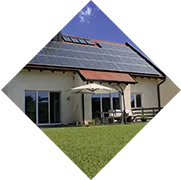Different Roof Styles Suitable for Solar Panel Installation and Energy Efficiency
Types of Roofs for Solar Panels
As the world shifts toward more sustainable energy solutions, solar power has emerged as a popular option for homeowners aiming to reduce their carbon footprint and save on energy costs. However, the effectiveness of solar panels can vary significantly depending on the type of roof they are installed on. This article explores the different roof types that are suitable for solar panel installation, examining their advantages and disadvantages.
1. Flat Roofs
Flat roofs are increasingly common in residential and commercial buildings, particularly in urban areas. These roofs offer several advantages for solar panel installation
- Ease of Installation Flat roofs provide ample space for solar panels, allowing for straightforward installation. Installers can use racking systems to angle the panels for optimal sunlight exposure.
- Flexibility in Design The flat surface allows for creative layouts, which can enhance the overall energy capture.
- Maintenance Access With a flat roof, maintenance of solar panels can be simpler, as technicians can easily access them without the risk of slipping or falling.
However, flat roofs also have some drawbacks. Accumulation of debris and water can be an issue, necessitating regular maintenance to keep the panels functioning optimally.
2. Pitched Roofs
Pitched roofs, often seen in residential buildings, have an inclined surface. These roofs can be categorized into various designs, such as gable, hip, and mansard roofs.
- Optimal Sunlight Angle The slope of pitched roofs allows for greater solar exposure, especially when oriented south. This can lead to higher energy production.
- Aesthetic Integration Solar panels can be installed in a manner that blends harmoniously with the roof’s design, which homeowners often prefer.
However, pitched roofs pose some challenges. The installation process may require more complex mounting systems, and the structural integrity of the roof must be assessed to ensure it can support the additional weight of the solar panels.
3. Metal Roofs
Metal roofs, made from materials like steel or aluminum, have gained popularity for their durability and longevity. They also offer unique advantages for solar panel installation
- Durability Metal roofs can last 40-70 years, making them a solid investment for homeowners considering solar energy
.types of roofs for solar panels

- Quick Installation Many metal roofs are designed to facilitate solar panel installation with integrated mounting systems, allowing for faster and more efficient setup.
- Reflective Surface Metal roofs can reflect sunlight, potentially reducing cooling costs and enhancing solar panel efficiency.
Nonetheless, metal roofs can be expensive to install, and the specific type of metal can influence the installation method.
4. Tile Roofs
Tile roofs, often associated with Mediterranean or Spanish-style architecture, present another viable option for solar panel installation.
- Longevity and Aesthetics Tile roofs are known for their durability and provide a distinctive aesthetic that appeals to many homeowners.
- Compatibility with Solar Panels Skilled installers can integrate solar panels into tile roofs with mounting systems designed specifically for this material.
However, the weight of tiles requires careful assessment of the underlying structure, and installation can be labor-intensive.
5. Asphalt Shingle Roofs
Asphalt shingle roofs are the most common roofing material in North America, primarily due to their affordability and ease of installation.
- Versatility Solar panels can be easily installed on asphalt shingles with standard mounting systems.
- Cost-Effectiveness For homeowners looking to install solar panels on a budget, asphalt shingles offer a good balance of affordability and function.
The downside is that asphalt shingle roofs typically have a shorter lifespan compared to metal or tile options, which may necessitate future replacements that could complicate solar installations.
Conclusion
When considering solar panels, the type of roof significantly impacts functionality and efficiency. Flat, pitched, metal, tile, and asphalt shingle roofs each come with their own set of advantages and challenges. Homeowners should evaluate their specific roofing material and structure to determine the best approach to harnessing solar energy, ultimately contributing to a more sustainable future. As solar technology continues to evolve, the compatibility with various roof types becomes increasingly sophisticated, making solar power more accessible than ever before.
-
String Solar Inverter: The High-Efficiency Solution for Smart Solar EnergyNewsJul.14,2025
-
Revolutionizing Rooftop Energy with the Power of the Micro Solar InverterNewsJul.14,2025
-
Power Independence with Smart Off Grid Solar Inverter SolutionsNewsJul.14,2025
-
On Grid Solar Inverter: Powering the Future with Smart Grid IntegrationNewsJul.14,2025
-
Monocrystalline Solar Panels: High-Efficiency Power for the Future of Clean EnergyNewsJul.14,2025
-
Bifacial Solar Panel: A Smarter Investment for Next-Generation Energy SystemsNewsJul.14,2025







